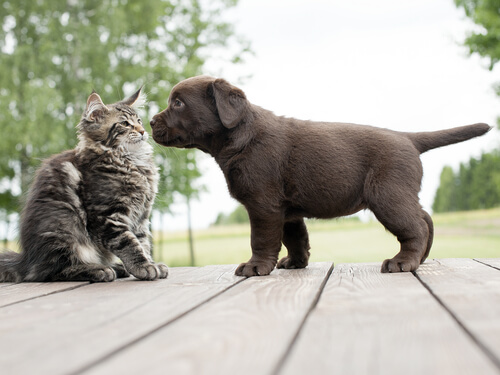The Beauty of The Black Dogs Project

Jet is one of the most sought after and highly-valued gemstones in the world. This is due to it’s brilliant and imposing color: black. However, even though the stone’s beauty lies in its color, this shade is not as well received by other species, or even other living beings. Let’s talk about how this applies as it relates to pets with black fur, for example.
The Black Dogs Project is a photographic report that, through their novel initiative, hopes to highlight the beauty in black dogs. Sure, it might sound ridiculous. But in reality, both cats and dogs that sport this color have more trouble finding a home.
Believe it or not, the superstition that black is linked to bad luck and bad omens has also carried over to wild life. This is the absolute truth, even though nature has shown us time and time again that black is a symbol of absolute beauty. For example, consider jet and onyx gemstones.
Because of this inherited superstition, far too many black animals are rejected and even abandoned without an excuse. Basically, the reason has to do with the color of their fur.
The Dark Beauty of The Black Dogs Project

Black, black and more black is all that is seen in this photographic initiative carried out by Fred Levy. The project is the result of the discriminatory situation that black dogs are forced to endure.
It takes black dogs much longer to find a home than it does other canines. Basically, this means that they also spend more time in the adoption centers.
The Black Dogs Project began when we realized that black dogs take longer to be adopted just because of their color.
— Fred Levy
This Project has developed into story where you can enjoy the beauty of black dogs along with their owners, who are as proud as can be about the color of their pet’s fur.
The photographs have a dark background that allow you to see the beauty and brilliance that radiate from these beautiful black dogs’ eyes and coats. These also contrast with the color of their owners’ outfits.
A Black Cat? A Black Dog?
Unfortunately, this is the way many people seem to think: in terms of the color of their fur. Many animal shelters and adoption centers do not provide numbers for the amount of animals that are not adopted because of their color. However, we know that black dogs are the most disadvantaged when it comes to finding a new home.
This is very sad, but still true. The color of an animal’s skin and fur should not have any influence over decisions that are made while choosing a pet. Pigmentation has nothing to do with an animal’s character or personality. After all, it’s what’s in their heart that counts.
Animals do not judge us because we are fat, tall, short or ugly. They love us with all of their hearts. And, we know it the minute they look into our eyes. Why don’t we stop focusing on their skin, their fur or even their physical beauty? Let’s start trying to decipher what is hidden beyond their gaze.

Color and consciousness
Stanley Coren conducted an experiment regarding the impact that the color of animals has on humans, even unconsciously.
He wanted to prove through a simple experiment that the feelings evoked in different people by black dogs are not the same as ones caused by dogs of other colors.
In order to achieve this, he selected 60 people. Then, he showed them photographs of different dog breeds and fur colors. In most cases, the fondness awakened by seeing a picture of a golden retriever, for example, was not demonstrated while seeing a black retriever.
The study’s findings
Even though the dogs were the same breed, they did not evoke the same feelings in the test subjects. It is incredibly sad, but it was scientifically proven to be true.
We figure that if you are reading our blog, it is because you are an animal lover. If you adopt a pet, we plead you never deny them your love. Especially show them your love if the mere color of their fur might prevent them from being adopted. Help to tear down the wall that has been built around black dogs. Defend and protect them just as you would want them to defend and protect you.
This text is provided for informational purposes only and does not replace consultation with a professional. If in doubt, consult your specialist.